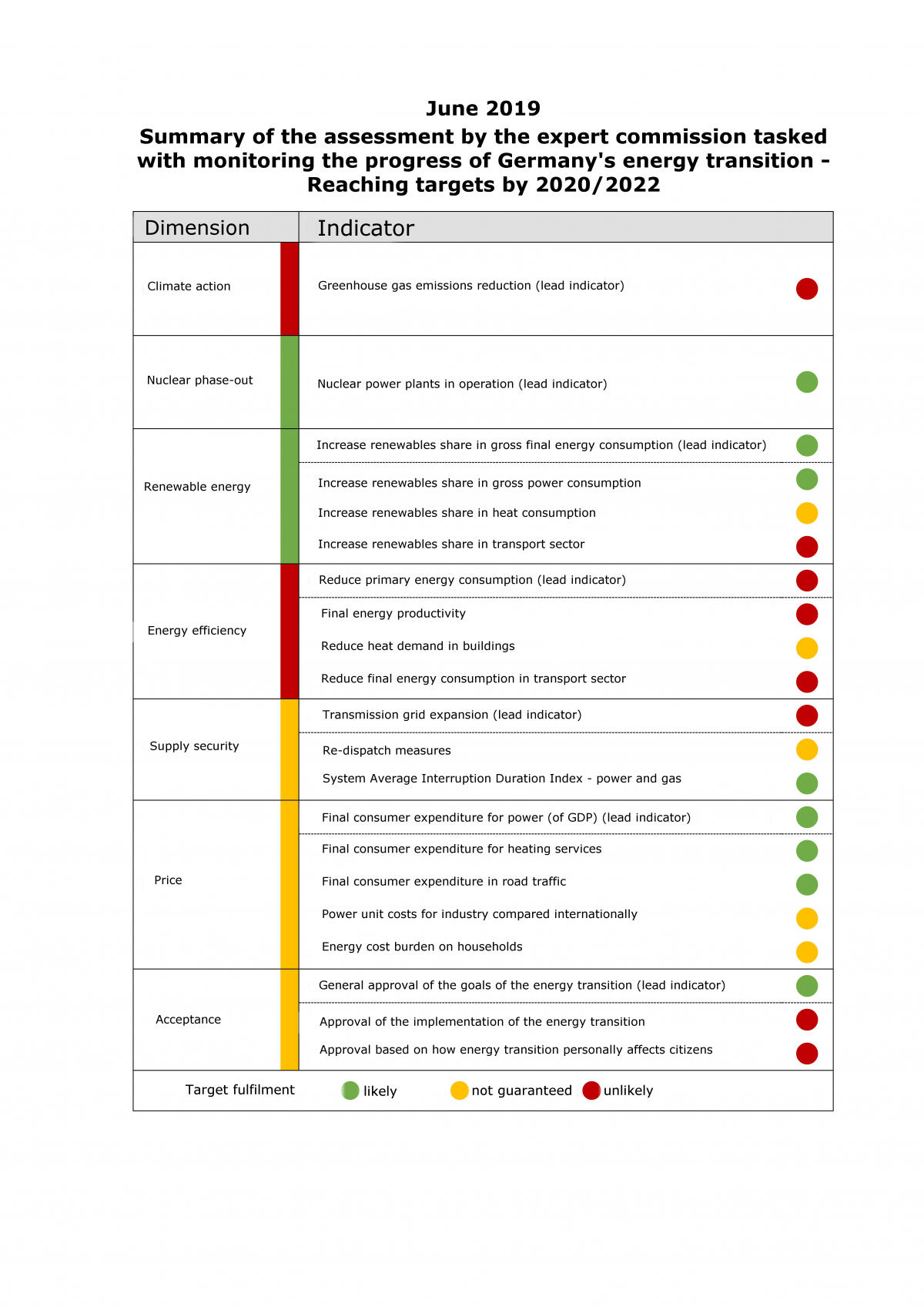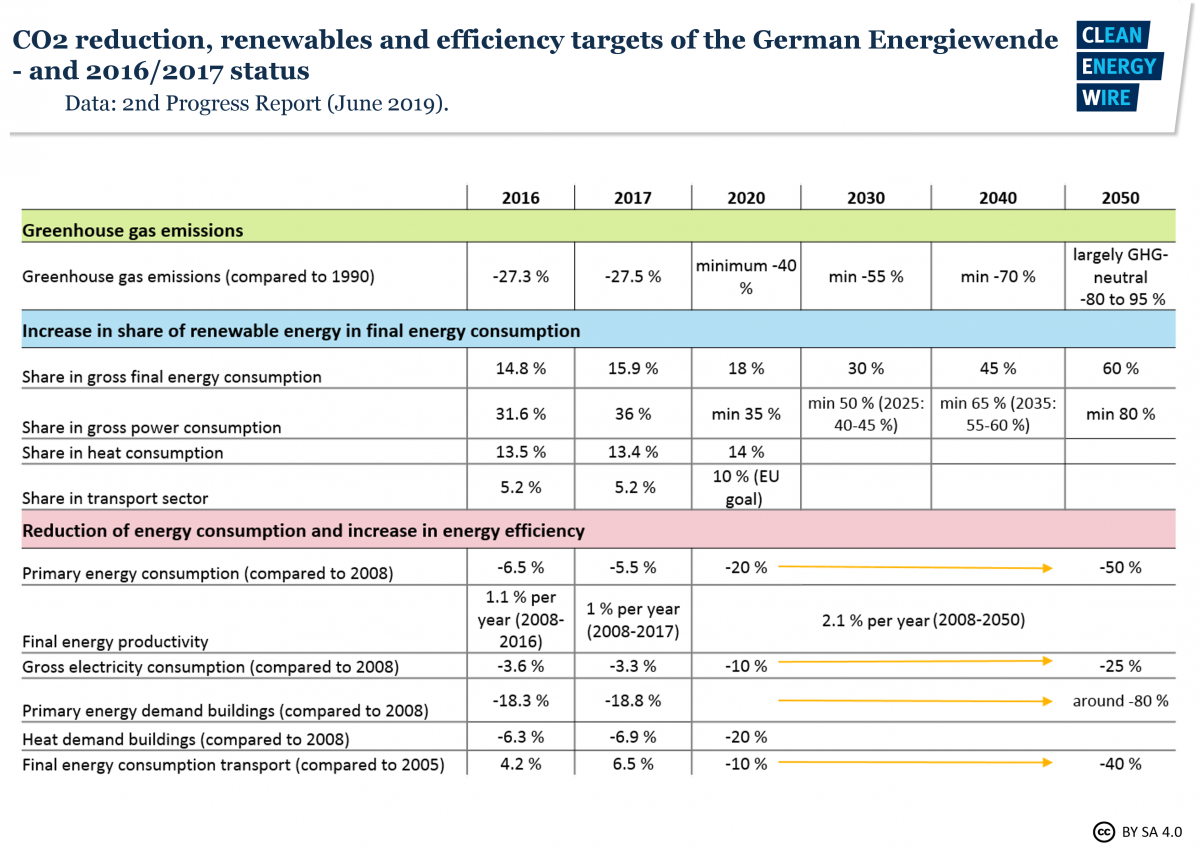Government advisors give low marks for German energy transition progress
Germany still lags behind in key areas of its transition to a decarbonised, nuclear-free economy, and the federal government has failed to provide answers on how to get the country back on track with the second progress report on the Energiewende. This is the assessment of the government-appointed expert commission tasked with monitoring the progress of the German energy transition in its opinion on the report, which Chancellor Merkel’s cabinet adopted today.
One year after the last Energiewende monitoring report “we see that the developments in the individual sectors continue to be insufficient,” the head of the expert commission, economist Andreas Löschel, told Clean Energy Wire. “This is especially true for climate action and efficiency, but also in regards to renewable energies outside of the electricity sector, for example in heating and transport.”
Compared to the assessments in previous years “practically nothing has changed” regarding the negative assessment of these areas, write the experts in their opinion. While they see Germany on track regarding renewables expansion in the power sector, further progress is at risk due to a lagging power grid development. They also see a “considerable need for action” in transport and buildings. The government’s report is based on 2017 data, but makes references to 2018 developments as well.
Germany is bidding farewell to nuclear energy, expanding renewable energy production and aiming to make its economy largely climate-neutral by mid-century. Europe’s most populous country initiated the decades-long overhaul of its economy — the Energiewende — with broad public backing and cross-party support. To monitor the progress of this endeavour in all economic sectors, the economy ministry publishes an annual Energiewende Monitoring Report, the last one in June 2018. It is accompanied by an opinion by the government-appointed expert commission tasked with monitoring the progress of the German Energiewende.
As Germany struggles to get on track to meet national and international targets, Chancellor Angela Merkel has set up the so-called “climate cabinet” to decide measures and the necessary legislation by the end of 2019. The cabinet has promised key decisions by September.
“The government has said that 2019 is supposed to be the year of climate action and energy transition,” said Löschel. “It’s of central importance to now set the right framework for the energy transition.”
Experts call for CO₂ pricing as part of comprehensive energy taxes and levies reform
In the experts’ view, this entails taking a closer look at Germany’s “multitude of small-scale measures in all economic sectors”. They call for a comprehensive reform of Germany’s energy taxes and levies. A part of this should be CO₂ pricing, they say, the new “lead instrument of the energy transition”.
Germany currently has a lively, sometimes heated debate about a price on CO₂ emissions, especially in economic sectors not covered by the EU Emissions Trading System (ETS), such as transport and buildings.
For Löschel, the focus of CO₂ pricing should be to make renewable electricity cheaper to use it in the other sectors (sector coupling). Many applications and developments in the transport or buildings sectors are held back because of high taxes and levies on electricity. “So the comprehensive reform of these is the next step of the Energiewende,” he said. “Introducing a price on CO₂ would enable us to get rid of other instruments and make electricity cheaper.”

The chances now are better than ever. Economists have called for CO2 pricing for years and we should use the current window of opportunity.
As the climate cabinet has put CO₂ pricing on its agenda, “chances are better than ever” to introduce a concept, said Löschel. In the short term, the government should adjust energy taxes, but in the medium to long term the ETS could be expanded to other economic sectors. Germany should look for European allies for a CO₂ price coalition, said the advisor.
“One of the largest modernisation projects for Germany as a business location”
Every three years, the ministry releases a progress report instead of the monitoring report. It provides broader context and more in-depth analysis with a medium to long-term time horizon.
The experts criticise that this year’s progress report is more like a regular monitoring report and say that the forward-looking chapters are “unconvincing in light of the expected target failure in essential areas of the energy transition”.
The economy ministry lists several laws and government programmes it still plans to implement in 2019 – such as an energy efficiency strategy and the planned coal exit – but many of these have not yet been drafted, or are still debated by ministries.
The government itself highlighted the positive developments regarding emissions reduction in the past two years, renewables expansion and continued high supply security in Germany. However, the report shows that “a good part of the way is still ahead of us” and especially the transport sector “is still at the beginning”, the ministry says in a press release.
“Business models will only be successful in the future if they incorporate the energy transition and climate action,” said economy minister Peter Altmaier (CDU). “The energy transition is not only a central energy policy project, it is also one of the largest modernisation projects for Germany as a business location.” Germany needs to better use the potential and show that jobs can be created with climate action and the Energiewende, said Altmaier.
Acceptance increasingly a challenge
While surveys showed that citizens still supported the general goals of the Energiewende, the implementation is met with increasing criticism, write the experts in their opinion. “The decreasing approval of many energy transition projects is clearly making it more difficult, for example, to expand renewable electricity supply and thus achieve the targets for the period up to 2030 and 2050.”
As the energy transition in the power sector has so far burdened especially low-income households, future measures must take into account distributional effects, they say. The experts recommend setting up an “energy transition citizens’ forum” in which actors from politics, administration, society, business and science come together to work with citizens in finding viable solutions.
The federal government plans to decide on measures to enhance acceptance by autumn 2019, according to the progress report.
Progress report chapters on role of gas “sparse and backward-looking”, say advisors
The experts criticise that the role of gas plays only a small role in the government’s progress report, despite its importance for the German energy supply. “Geopolitical implications of gas supply and the urgently needed expansion of the European gas infrastructure are not dealt with or only briefly,” they write.
The gas industry currently lacks the necessary planning security, because the German government fails to provide “clear policy ideas and guidelines” on the future use of the fuel, according to the progress report.
The expert commission recommends examining imports of renewables-based synthetic fuels to top up domestic renewable energy supply even before 2030, such as hydrogen, which could be fed into the German gas grid.
For the long-term perspective, the experts say that Germany must reduce greenhouse gas emissions by 95 percent to reach the Paris Agreement goal of limiting global warming to below 2 degrees Celsius. They criticise that the government’s progress report lacks a clear vision for the role of (renewable) gas in the future energy system “despite its immense importance”. Raising the ambition of Germany’s mid-century climate target to 95 percent will likely require an “extensive use” of renewable power-based synthetic fuels.




